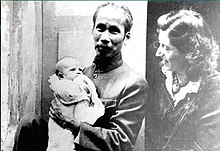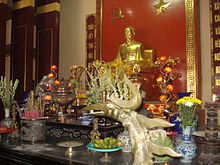Legacy and personality cult
The former capital of South Vietnam, Saigon, was officially renamed Ho Chi Minh City on 2 July 1976[68] by the new VCP-controlledNational Assembly of Vietnam. However, the name provokes strong anti-communist feeling in a substantial number of Vietnamese. Many Vietnamese, especially those living abroad, continue to refer to the city as Sài Gòn, in rejection of the new Communist-imposed name and in honor of the former capital of anti-communist, republican South Vietnam.[69]
Ho's embalmed body is on display in Hanoi in a granite mausoleum modeled after Lenin's Tomb in Moscow. Streams of people queue each day, sometimes for hours, to pass his body in silence. This is reminiscent of other Communist leaders like Kim Jong-il and his father Kim Il-sung, Vladimir Lenin, and Mao Zedong.
The Ho Chi Minh Museum in Hanoi is dedicated to his life and work.
Chilean musician Víctor Jara referenced Ho Chi Minh in his song "El derecho de vivir en paz" ("The Right to Live in Peace").
In Vietnam today, Ho's image appears on the front of all Vietnamese currency notes. His portrait and bust are featured prominently in most of Vietnam's public buildings, in classrooms (both public and private schools) and in some families' altars. There is at least one temple dedicated to him, built in Vĩnh Long shortly after his death, in 1970, in Viet Cong-controlled areas.[70]
The Communist regime has also continually maintained a personality cult around Ho Chi Minh since the 1950s in the North, and later extended it to the South, which it sees as a crucial part in their propaganda campaign about Ho and the Party's past. Ho Chi Minh is frequently glorified in schools to schoolchildren. Opinions, publications and broadcasts that are critical of Ho Chi Minh or that identify his flaws are banned in Vietnam. Both Vietnamese and foreign activists, writers, reporters and commentators who criticize anything about Ho in the slightest are arrested and imprisoned or fined for "opposing the people's revolution". Ho Chi Minh is even glorified to a religious status as an "immortal saint" by the Vietnamese Communist Party, and some people "worship the President", according to a BBC report.[69]
Publications about Ho's non-celibacy are banned in Vietnam, because the Party maintains that Ho had no romantic relationship with anyone in his lifetime in order to portray a puritanical image of Ho to the Vietnamese public, and advance the image of Ho as "the father of the [communist] revolution"[71] and of a "celibate married only to the cause of revolution".[72] A newspaper editor in Vietnam was dismissed from her post in 1991 for publishing a story about Tang Tuyet Minh.[73][74]William Duiker's Ho Chi Minh: A Life (2000) presents much information on Ho's relationships.[8]:605, fn 58 The government requested substantial cuts in the official Vietnamese translation of Duiker's book, which was refused.[75] In 2002, the Vietnamese government suppressed a review of Duiker's book in the Far Eastern Economic Review.[75] In 1987, UNESCO officially recommended to member states that they "join in the commemoration of the centenary of the birth of President Ho Chi Minh by organizing various events as a tribute to his memory", considering "the important and many-sided contribution of President Ho Chi Minh in the fields of culture, education and the arts" who "devoted his whole life to the national liberation of the Vietnamese people, contributing to the common struggle of peoples for peace, national independence, democracy and social progress."[76] There's also a personality cult surrounding Nguyễn Sinh Sắc, Ho Chi Minh's father.



No comments:
Post a Comment